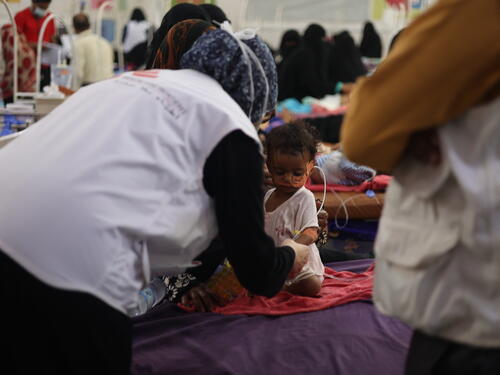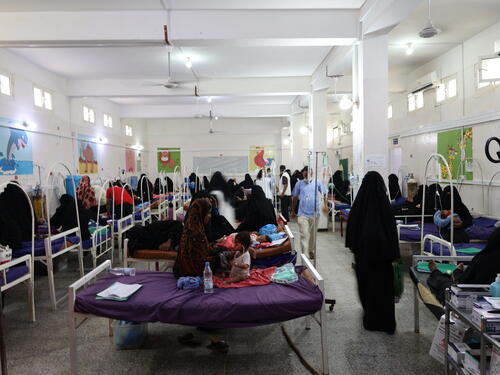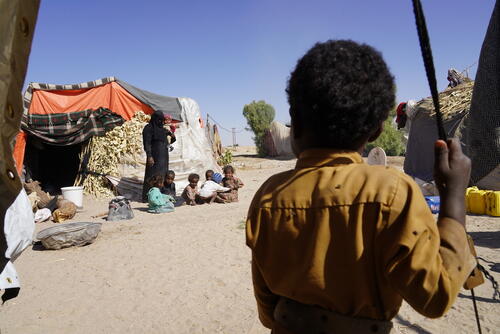Malnutrition is a persistent risk to children in Yemen. The country sees seasonal and annual peaks, usually linked to the lean season caused by the disruption of agricultural production in rural areas. This pattern was seen before the escalation of the war in late 2014, but it has worsened due to the ongoing conflict, which has exacerbated food insecurity for vulnerable people.
But there is more to malnutrition than food insecurity. Here are five reasons why malnutrition is rapidly increasing across Yemen.
1. People can't afford food
Many families in Yemen are unable to afford enough nutritional food as the country’s deepening economic crisis has caused prices to soar. Many people do not have access to paid work or have lost their homes due to the eight-year-long war. The value of the Yemen Riyal is depreciating, and food and transportation costs - including fuel - are rising, which further impede people’s access to sufficient food.
We rarely can afford to give him milk. We don’t have access to health centres that provide therapeutic food nearby.Shohra Mohamed, grandmother of Abdallah, who is suffering from malnutrition
“We came to Abs Hospital several times and he was improving,” says Shohra Mohamed, grandmother of who Abdallah, who is suffering from malnutrition and other complications.
“We prefer to come here as the services are free of charge. Abdallah’s father is away. With his mother, we try to feed him with what we have, we rarely can afford to give him milk. We don’t have access to health centres that provide therapeutic food nearby,” she says.

Child malnutrition in Yemen
2. Lack of access to basic healthcare
The healthcare network across Yemen continues to collapse. Limited financial resources of health authorities, shortages of supplies and equipment, as well as irregular salaries for medical staff have all caused many public health facilities to close.
Along with the high cost of fuel, people's access to urgent medical care is seriously limited. This often delays people receiving much-needed treatment, which in turn leads to complications that could have been prevented, including malnutrition.
Our teams in Amran governorate working in Al-Salam-Khamer Hospital have seen a steady increase in the number of patients with severe acute malnutrition (SAM) since the end of May. The bed occupancy rate in the inpatient therapeutic feeding centre (ITFC) reached 396 per cent in September 2022.
At the same time, there was a more than 20 per cent increase in the number of emergency consultations. Between January and September 2022, 31 patients with SAM died after admission. Most arrived too late and had medical complications that were too severe to be treated.
Many of the people who were admitted to the MSF-supported Al-Salam Hospital with SAM travelled from surrounding areas where the basic healthcare facilities were only partially functioning. A similar trend was observed in Al-Hudaydah governorate.
Our team in the emergency department of Ad-Dahi Hospital received 1,902 children suffering from malnutrition with complications, between January and October 2022.

3. Poverty and unstable living conditions
Poor living conditions, especially for those who have been displaced, also contribute to the rise of malnutrition. Abs Hospital receives patients from the surrounding areas, where many displaced people live without proper shelter and with limited access to food or income.
From January to September, the MSF-supported ITFC at Abs Hospital admitted 2,087 children with malnutrition and associated medical complications.
“Most of the displaced people don’t have a regular income due to difficulties in accessing [employment] opportunities,” says Saddam Shayea, MSF health promotion supervisor at Abs Hospital. “Another issue is the lack of access to clean water, which increases cases of diarrhoea.”

4. Limited health awareness
There is a great need to increase access to information for antenatal care (ANC) and post-natal care (PNC), which are directly linked to malnutrition. The poor availability and accessibility of this care is leading to complicated pregnancies. At Abs Hospital, in 2022, more than 50 per cent of mothers in the maternity department were suffering from malnutrition.
In addition, there is limited awareness in the community about the importance of breastfeeding and routine vaccinations for children. Parents also don’t have access to information about identifying the initial symptoms, which delays the detection and prevention of malnutrition.
5. Gaps in the humanitarian response
This year, funding cuts have caused general healthcare facilities to discontinue services or have insufficient medical supplies.
“I have four children who were all suffering from malnutrition,” says Ahmed Abu Al Ghaith, a father who brought his one-year-old daughter suffering from SAM to the Ad Dahi hospital. “I took them to the nearest malnutrition treatment centre in the area. But they had to choose and prioritise among my children to give them some therapeutic food, as there was not enough.”
In addition to the discontinuation of some health programmes, there are also gaps in nutrition and food assistance programmes, as well as inadequate water, sanitation and hygiene services. Combined, these factors have increased the risk of malnutrition and related complications, which are made even more dangerous with the threat of waterborne diseases.
MSF works in 13 of Yemen’s 21 governorates. in most of our facilities, we have witnessed a concerning surge in the number of malnourished children with medical complications. This has pushed bed occupancy rates well above 100 per cent capacity across our ITFCs. To cope with the increased numbers of malnutrition cases and to reduce morbidity and mortality among the most vulnerable, our teams are scaling up capacity across projects in the ITFCs and other departments, increasing our support to general healthcare centres, and increasing health promotion activities.






